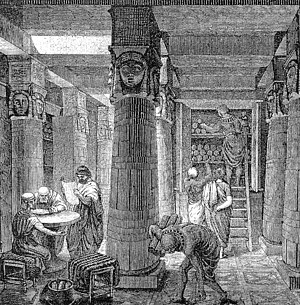Library of Alexandria
The Great Library of Alexandria in Alexandria, Egypt, was one of the largest and most significant libraries of the ancient world. The Library was part of a larger research institution called the Mouseion, which was dedicated to the Muses, the nine goddesses of the arts. The Library quickly acquired a large number of papyrus scrolls, due largely to the Ptolemaic kings' aggressive and well-funded policies for procuring texts. It is unknown precisely how many such scrolls were housed at any given time, but estimates range from 40,000 to 400,000 at its height.
Alexandria came to be regarded as the capital of knowledge and learning, in part because of the Great Library. Many important and influential scholars worked at the Library during the third and second centuries BC.
The Library dwindled during the Roman Period, due to lack of funding and support. Its membership appears to have ceased by the 260s AD. Between 270 and 275 AD, the city of Alexandria saw a rebellion and an imperial counterattack that probably destroyed whatever remained of the Library, if it still existed at that time. The daughter library of the Serapeum may have survived after the main Library's destruction. The Serapeum was vandalized and demolished in 391 AD under a decree issued by Coptic Christian Pope Theophilus of Alexandria, but it does not seem to have housed books at the time and was mainly used as a gathering place for Neoplatonist philosophers following the teachings of Iamblichus.[1]
Founder Records
The great Library of Alexandria in Egypt was the last significant library on the earth that acted as the repository for recording what was known about the Universal Laws and Hermeticism, as translated from and found in the manuscripts copied from the Emerald Founder Records. Thus, in the ancient world Alexandria was the capital of knowledge and true learning, which was modeled directly from those who still remembered the great libraries and educational centers that had existed long before in the Atlantian Colonies. [2]
References


